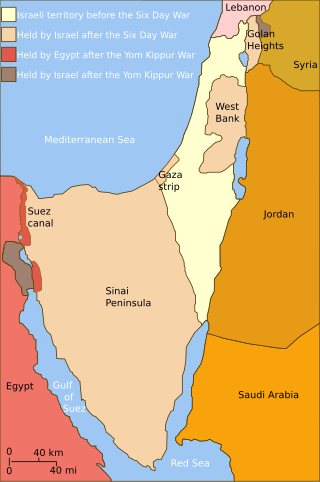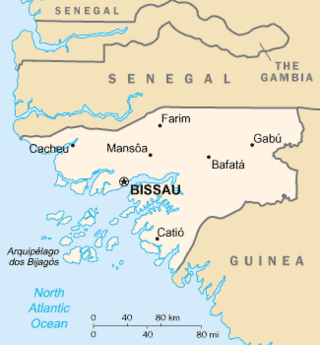
United Nations Security Council Resolution 338 was a three-line resolution adopted by the UN Security Council on 22 October 1973, which called for a ceasefire in the Yom Kippur War in accordance with a joint proposal by the United States and the Soviet Union. It was passed at the 1747th Security Council meeting by 14 votes to none, with China abstaining.
United Nations Security Council Resolution 178, adopted unanimously on April 24, 1963, after hearing of violations of Senegalese territory by Portuguese military forces from Portuguese Guinea, the Council deplored the incident at Bouniak as well as any incursion by the Portuguese and requested that they honor their declared intention to "scrupulously respect the sovereignty and territorial integrity of Senegal".
United Nations Security Council Resolution 275, adopted on December 22, 1969, after a letter from the representative of Guinea and observing that these incidents by Portugal jeopardize international peace and security, the Council called upon Portugal to desist from violating the sovereignty and territorial integrity of Guinea. The Council deeply deplored the loss of life and heavy damage to several Guinean villages inflicted by the action from Guinea-Bissau, a territory under Portuguese administration, solemnly warning Portugal that if such acts were to be repeated in the future the Council would consider further steps to give effect to the resolution. It also called upon Portugal to release a motor barge by the name of Patrice Lumumba and all of its passengers.
United Nations Security Council Resolution 290, adopted on December 8, 1970, after more invasions of the territory of the Republic of Guinea by naval and military units of Portugal on November 22/23 and 27/28, the Council reaffirmed its numerous previous resolutions on the topic, including the right of the peoples of Angola, Mozambique and Portuguese Guinea to be freed from the Portuguese Empire ruled by the Estado Novo regime. The Council endorsed the conclusions of the report by the Special Mission to the Republic of Guinea, strongly condemned the Portuguese Government, demanded that full compensation be paid to the Republic and declared that Portuguese colonialism was a serious threat to the peace and security of Africa.
United Nations Security Council Resolution 294, adopted on July 15, 1971, disturbed by the longstanding Portuguese violations of Senegalese territory and the recent laying of mines inside that nation which was giving shelter to independentist guerrillas of PAIGC, during the Portuguese Colonial War. The Council noted Portugal's failure to comply with previous resolutions and demanded that they immediately cease all acts of violence and destruction in Senegal and respect her territorial integrity. The Council included the usual condemnations and requested that the Secretary-General urgently send a special mission of members of the Council assisted by their military experts to carry out an inquiry into the facts of the situation and make recommendations.
United Nations Security Council Resolution 295, was adopted unanimously on August 3, 1971. After receiving a letter from the Permanent Representative of Guinea, a country led by Ahmed Sékou Touré, the Council affirmed its territorial integrity and independence and decided to send a mission of three members of the Council to Guinea to consult with the authorities and report of the situation immediately. The mission was to be appointed after consultation between the president of the Council and the Secretary-General.
United Nations Security Council Resolution 302, adopted on November 24, 1971, after reaffirming previous resolutions on the topic, the Council expressed its appreciation for the work accomplished by the Special Mission established in resolution 294. The Council deplored the lack of co-operation with the Special Mission by the Portuguese and called upon its government to take effective measures so that the territorial integrity of Senegal would be respected and to prevent acts of violence and destruction against the territory and its people.
United Nations Security Council Resolution 312, adopted on February 4, 1972, after reaffirming previous resolutions on the topic and deploring those who failed to conform to them the Council called upon Portugal to immediately recognize the right of the peoples of her colonies to self-determination, to cease all acts of repression against the peoples of Angola, Mozambique and Guinea (Bissau), to withdraw its armed forces from those areas, to promulgate an unconditional political amnesty and to transfer power to freely elected native representative institutions.

United Nations Security Council Resolution 322, adopted unanimously on November 22, 1972, after reaffirming previous resolutions and considering the Organisation of African Unity's recognition of the revolutionary movements of Angola, Guinea-Bissau, Cape Verde and Mozambique, the Council called on the government of Portugal to cease its military operations and all acts of repression against the people of those territories. The Resolution called on Portugal to enter negotiations with the parties concerned with a view to achieving a solution to the armed confrontations and permitting the peoples of those territories to exercise their right to self-determination and requested the Secretary-General to follow developments and report periodically to the Council.
United Nations Security Council Resolution 333, adopted on May 22, 1973, after reiterating previous statements and admitting that previous measures had yet failed to bring about the end of the "illegal regime in Southern Rhodesia" the Council condemned South Africa and Portugal for failing to co-operate with the implementation of sanctions and requested that urgent action be taken to implement them. The Council then requested that states with legislation permitting importation from Rhodesia repeal it immediately and called upon states to enact and enforce legislation against any person who tries to evade of commit a breach of sanctions by:
Operation Green Sea was an amphibious attack on Conakry, the capital of Guinea, by between 350 and 420 Portuguese soldiers and Portuguese-led Guinean fighters in November 1970. The goals of the operation included the overthrow of Ahmed Sékou Touré's government, capture of the leader of the African Party for the Independence of Guinea and Cape Verde (PAIGC), Amílcar Cabral, destruction of the naval and air assets of the PAIGC and its Guinean supporters, and the rescue of Portuguese POWs held in Conakry.

United Nations Security Council resolution 1216 was adopted unanimously on 21 December 1998. After expressing concern at the crisis and humanitarian situation in Guinea-Bissau, the Council called for the immediate establishment of a government of national unity in the National People's Assembly and the holding of elections by the end of March 1999.

United Nations Security Council resolution 1233, adopted unanimously on 6 April 1999, after reaffirming Resolution 1216 (1998) on the situation in Guinea-Bissau, the council established the United Nations Peacebuilding Support Office in Guinea-Bissau (UNOGBIS) to facilitate the implementation of the Abuja Accord.

United Nations Security Council resolution 1467, adopted unanimously on 18 March 2003, after expressing concern at the situation in West Africa, the Council adopted a declaration regarding the proliferation of weapons and mercenary activities in West Africa.

United Nations Security Council resolution 1580, adopted unanimously on 22 December 2004, after reaffirming resolutions 1216 (1998) and 1233 (1999) on the situation in Guinea-Bissau, the Council extended the mandate of the United Nations Peacebuilding Support Office in Guinea-Bissau (UNOGBIS) for a further period of one year and revised its operations. It was the final Security Council resolution adopted in 2004.

United Nations Security Council Resolution 1949, adopted unanimously on 23 November 2010, after recalling previous resolutions on the situation in Guinea-Bissau, particularly Resolution 1876 (2009), the Council extended the mandate of the United Nations Integrated Peacebuilding Office in Guinea-Bissau (UNIOGBIS) for a further period of one year until 31 December 2011.

Resolution 1973 was adopted by the United Nations Security Council on 17 March 2011 in response to the First Libyan Civil War. The resolution formed the legal basis for military intervention in the Libyan Civil War, demanding "an immediate ceasefire" and authorizing the international community to establish a no-fly zone and to use all means necessary short of foreign occupation to protect civilians.
United Nations Security Council Resolution 1876 was unanimously adopted on 26 June 2009.
Overseas province was a designation used by Portugal for its overseas possessions, located outside Europe.
The Declaration on the Rights of Peasants is a United Nations General Assembly resolution on human rights with "universal understanding", adopted by the United Nations in 2018. The resolution was passed by a vote of 121-8, with 54 members abstaining.






